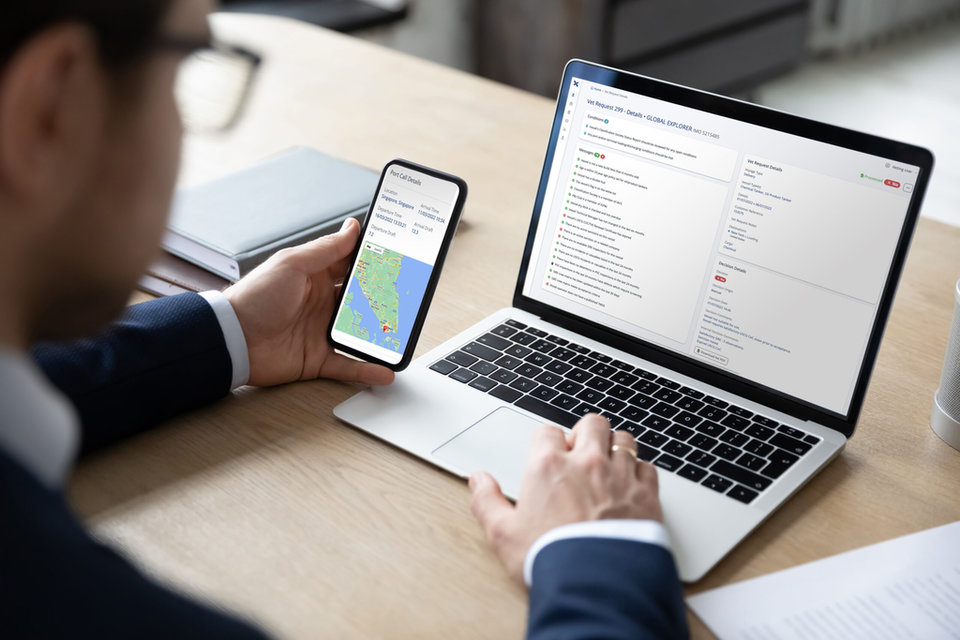Business & Operations
Applying human and artificial intelligence to maritime matters
MIS Marine’s Americas executive Gonzalo Mera Truffini explains how marine assurance can move beyond the fundamentals of safety and pollution prevention by leveraging the latest technologies to help in the most complex situations.
As shipping grapples with the ongoing Russian sanctions puzzle while progressing its environmental regulatory targets, the reality is that ship owners, operators, charterers, and energy companies alike must assess their entire risk portfolio to remain operational, efficient, and compliant in today’s ever-changing world.
Gone are the days when only energy majors evaluated their complete risk profile. To successfully navigate through the transforming maritime sector, the entire supply chain now requires big data on sanctions, environmental performance, regulations, human safety, and vessel behaviour.
Combining intelligence from multiple high-level data sources and detailed analyses will support decision-making on all of these matters. This is where marine assurance plays a vital role, providing not just vetting but also supporting compliance functions.
Reacting to the sanctions maze
The ongoing situation regarding sanctions following Russia’s invasion of Ukraine is constantly evolving and requires the entire industry to be reactive and vigilant to ensure compliance. At the time of writing, there have been almost 4,000 sanctions introduced, and 3,172 distinct vessels would be classed as associated with Russia under the European Union’s port ban.
This has left many charterers having to make quick decisions and reassess criteria that is the fundamental basis for these operational choices.
In addition, energy companies, charterers, ports, and terminals require a comprehensive understanding of sanctions as they happen, and a daily level of analysis to establish their levels of risk exposure to the Russian market, based on specific products. Add to this the need to consider crew welfare and safety that require sensitivity and data in equal measure, and multiple operators across the industry have a lot of new data-based decision making to manage.
Making decisions on when and how to react to specific sanctions has become more difficult.
Although responding to the increasing sanctions is automated to an extent, what we’re seeing first-hand is the surge in demand for risk assessment combined with human intelligence, interpretation, and analysis. Automated systems can only go so far in helping companies work through the sanctions on Russia, and a simple checklist is not viable in this scenario.
Making decisions on when and how to react to specific sanctions has become more difficult, which reinforces the need for a change in mindset on vetting practises and marine assurance.
Often under-utilised and misunderstood, marine assurance plays a critical role in raising standards across the entire global value chain. Pairing human intelligence with data relating to vessel locations, voyage histories, vessel ownership and operation, as well as cargo and crew manifests, is a powerful tool in this ever-changing climate.
Prevention is better than cure
Understanding your complete risk profile – whether it be in the form of compliance or regulatory failings to indirect business with a sanctioned entity – is made possible by marine assurance technology and partners that take this approach. So how can marine assurance now be taken to the next level to support with other key challenges in maritime?
The shipping industry has proved that it can react quickly and relatively well to external circumstances, but it must now apply this thinking more proactively. For those shipping and energy players who have made solid decisions using in-depth data with human insight, this set baseline of reactiveness must now be applied to further improve standards for environmental and safety matters.
This presents a prime opportunity to get ahead and prevent incidents and accidents from happening in the future, using marine assurance platforms.
When a regional legislative environmental framework is weak, big data paired with detailed insight can support in driving greater awareness of, and practises for climate issues. Besides the biggest motivators of avoiding incurred costs and fines, there must be more onus on stakeholders demonstrating social responsibility, operational excellence and holding accountability as a business.

The damaging effects on the environment and the consequential costs are extremely high in the case of oil spills, as are the detrimental impacts on marine life, people, communities, and company’s reputations. Even 11 months after the major oil spill in the Pacific Ocean near Peru, cleaning efforts are ongoing with more than $57m spent on the initial response and the current remediation of the affected areas.
From a risk perspective, due to the lack of capabilities and support for an effective response to major incidents, the situation demands a hardening of the preventive measures and barriers taken by the organisations.
Here lies an opportunity to take a major step forward in improving standards on these environmental cases by acting before they happen with the implementation of vetting and marine assurance disciplines within the organisations. By building an awareness and understanding of how vessels could increase risk levels and having the support of marine assurance insight systems, organisations can efficiently, and cost effectively develop and implement better practices to reduce their risk profile.
Providing access to real-time accurate data supports the marine value chain in improving decisions on environmental standards, increased safety and compliance. It also helps developing countries in learning how to reduce their risk exposure through the application of best practice and the implementation of accessible marine assurance technologies.
As is often the case and wherever possible – prevention is better than cure.
Main image: MIS Marine’s Americas executive Gonzalo Mera Truffini